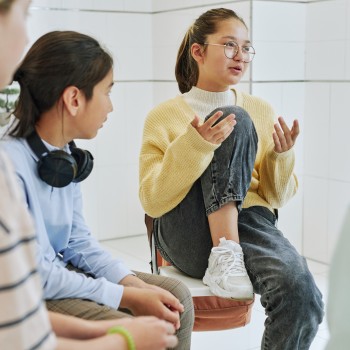Last updated on
Resilience is a powerful quality that allows us to bounce back from adversity, cope with challenges, and adapt to change. It's not about being invincible or never experiencing difficulties—it's about having the flexibility, skills and support to navigate through tough times and come out stronger on the other side. Fostering resilience in the young people we care about is crucial for their overall wellbeing. By modelling resilience ourselves and by teaching it as a skill, we can help give young people the tools they need to meet challenges.
Building a Strong Foundation
Resilience starts with a strong sense of self-worth and confidence. We can help young people develop a sense of self-worth by acknowledging their strengths and encouraging their interests and passions. Provide opportunities for them to set and achieve realistic goals, and celebrate their accomplishments. Treat their ideas and feelings with respect and interest to ensure they feel like an important part of your life. By nurturing their self-belief, you empower them to face challenges head-on.
Supporting a Growth Mindset
A growth mindset supports the idea that skills can be developed through effort and learning. Show young people that setbacks and failures are not reasons to give up, but opportunities for growth and learning. Help reframe failures as steps towards success and encourage perseverance. Emphasize that we can all improve our skills with practice and dedication.
Problem-solving Together
Often resilience means responding to, rather than avoiding, the problems we encounter. Encouraging young people to try problem-solving in a safe environment can help them build skills for difficult situations later on. Show how you might approach solving problems, for example by writing them out, brainstorming solutions, and considering pros and cons. After solving a problem together, talk about what you’ve learned: what worked? What didn’t? What was easy or hard to do?
Developing Emotional Intelligence
Emotional intelligence involves understanding and managing our emotions and empathizing with others. Encourage open communication about their feelings and validate their emotions. If you have ways of dealing with emotional situations (like counting to ten, or writing down what you want to say before saying it), share them. When we understand how we’re feeling and why, we can think about how our feelings might impact our choices, and work on addressing them without unintended consequences.
Cultivating Social Connections
Social support is a huge protective factor in building resilience. Foster a sense of belonging and community by encouraging young people to engage in activities that promote cooperation and collaboration, and if you can, get involved in community yourself. Encourage young people to seek support when needed and show them how to be supportive of others. Strong community connections provide a network of support during difficult times and help foster self-worth.
Emphasizing Self-Care
Resilience means taking care of ourselves physically, mentally, spiritually and emotionally. As adults, sometimes we prioritize young people’s needs over our own, but when we can, it’s important to model good self-care, by everyday actions like eating well and getting rest, by engaging with our communities, hobbies and interests, and by seeking support when we need it. Encourage young people to do the same, and to express their needs. The ability to recognize what we need and address it is a key part of resilience.
Modelling Resilience
Young people learn by observing the adults around them. Sharing stories of your own challenges and how you overcame them can help show young people that it’s okay to be challenged, and okay to talk about it—as well as giving them ideas about how to approach problems. By showing your own resilience, you can help cultivate theirs.
Resources
Showing 4 Resources
Foundry Virtual BC
Foundry Virtual BC offers free mental health and wellness services for youth aged 12 to 24 and their caregivers. Services include:
- Counselling
- Peer Support
- Groups & Workshops
- Physical & Sexual healthcare
- Employment & Education Services
- Indigenous Wellness Services
Download the Foundry BC app and register for an account to access services.
Foundry Centres
Offers free health and wellness services for young people ages 12 to 24 and their families/caregivers, providing access to mental health care, substance use supports, physical and sexual health care, peer support, and work, education and community services. Services are provided together in a single place to make it easier for young people to find the care, connection and support they need.
Centres provide safe, non-judgmental care, information and resources in a youth-friendly space. Foundry meets young people where they're at, empowering them to guide their own journeys towards living good lives.
If you do not have a Foundry centre in your community, click here to learn more about virtual services.
Multiple Locations
Child and Youth Mental Health Clinics
Free mental health clinics for children and youth in locations across B.C.
FamilySmart
Free programs that help B.C. families and caregivers who are parenting children and youth facing mental health challenges.
